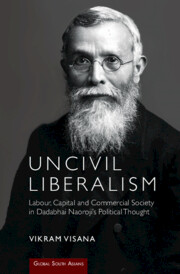Book contents
- Frontmatter
- Dedication
- Contents
- List of Abbreviations
- Acknowledgements
- Introduction
- 1 Sociality in an Imperial and Industrial Age
- 2 Sociality and the Parsis of Western India
- 3 Civil Society and Social Reform
- 4 Conceptualizing the Drain Theory
- 5 Making Commercial Society in India
- 6 Making Commercial Society in Britain
- 7 The Afterlives of Naoroji’s Political Thought
- Conclusion
- References
- Index
5 - Making Commercial Society in India
Published online by Cambridge University Press: 27 September 2022
- Frontmatter
- Dedication
- Contents
- List of Abbreviations
- Acknowledgements
- Introduction
- 1 Sociality in an Imperial and Industrial Age
- 2 Sociality and the Parsis of Western India
- 3 Civil Society and Social Reform
- 4 Conceptualizing the Drain Theory
- 5 Making Commercial Society in India
- 6 Making Commercial Society in Britain
- 7 The Afterlives of Naoroji’s Political Thought
- Conclusion
- References
- Index
Summary
The Irish Home Rule question was catapulted to the top of the British political agenda in 1868 with William Ewart Gladstone making it a centrepiece of his election campaign. As a result, the Irish land question flourished in British public debate around the same time that Naoroji was conceptualizing his labour theory of value. It is hardly surprising that in Naoroji's comparative political economy, British commentary on the condition of Ireland was an ever-present foil to the situation in India. Moreover, the elite commentary on Irish agrarian distress, tenancy rights and British rule was an important historical antecedent to Naoroji's own concerns since questions of Irish proprietary right resembled those of the subcontinent. Nevertheless, Naoroji parted ways with major policy interventions on the Irish question by influential pundits like J. S. Mill who initially advocated land nationalization, switching later to a doctrine of owner-occupation, or persisted with archaic economic doctrines like that of the wage fund. Sensitive to the Irish debate but not repeating it, Naoroji charted his own vision for commercial society that reinstated natural justice by minimizing the colonial state's financial monopoly.
By the late 1880s, Naoroji was in regular correspondence with Irish Land Leaguers like Michael Davitt, co-operating with him in movements for land reform in England. However, it was the economic writings of individuals who linked land issues with pauperization in the United Kingdom that bear striking resemblance to Naoroji's own critique, and the most significant among these was Henry Fawcett, with whom Naoroji was well acquainted since the 1860s. In many ways, Fawcett's views about Irish tenant farmers echoed those of his intellectual mentor, J. S. Mill, and the student of his political economy, J. E. Cairnes. Fixity of tenure and the right of the labourer to a fair share of the value he had produced featured prominently in these discussions. Mill also castigated absentee landlords for facilitating a system of unilateral transfers from Ireland to Britain that resulted in deteriorating terms of trade and an increase in the cost of Irish imports – a paradigm Naoroji cited in his own drain theory. Consequently, in 1868 Mill advocated land nationalization in Ireland, but by 1870 this was replaced by a gradual transfer of land to a productive yeomanry of co-operative farmers who could reap rewards proportional to their investment and labour.
- Type
- Chapter
- Information
- Uncivil LiberalismLabour, Capital and Commercial Society in Dadabhai Naoroji's Political Thought, pp. 123 - 149Publisher: Cambridge University PressPrint publication year: 2022



